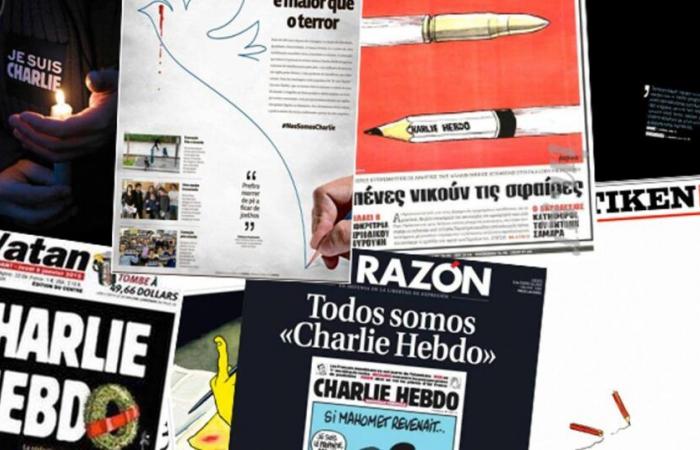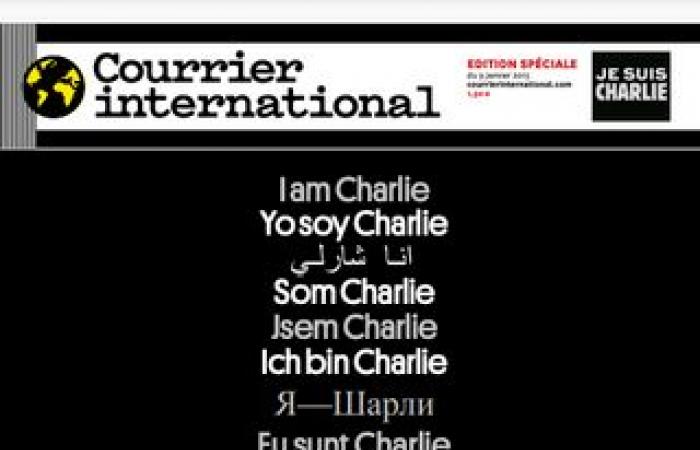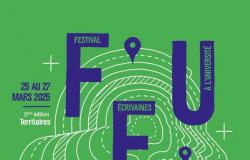On January 7, 2015, a few hours after the attack carried out by the Kouachi brothers, the Tunisian magazine Leaders already pays tribute to the twelve victims, “mowed down by human stupidity”.
For several hours, news channels around the world have been devoting their live coverage to the attack. “Journalists do not have automatic weapons, our only weapon is words and pencils”said the correspondent of Pervy Kanal, Russia's leading television channel, brandishing a pen among the demonstrators gathered at Republic Square.
A global emotion, visible on the front pages of the foreign press the following days, reproduced in these slideshows published by International mail January 8 and 9. They are crossed out with the slogan “Je suis Charlie”, illustrated with press cartoons or old front pages of the satirical weekly.
Opposite, the front page of the Argentinian newspaper Page 12 takes the model of Charlie Hebdo, with a white one, riddled with twelve bullets. In the aftermath of the attack, International mail also reproduces drawings published in the foreign press.
“The streets of Paris, which Descartes, Diderot and Voltaire once walked, were covered in blood, writes Alex Rowell for the Lebanese media Now. Once again, the humorous, ironic and intellectual spirit is hit in the face by the fist of fascism. But this time the blow is harder – in fact, it is difficult to think of a more direct and bloody attack on freedom of expression in Europe for several decades.”
On January 9, International mail publishes a special issue “dedicated to all press freedom fighters around the world”. It includes in particular the text of a British historian published by the Financial Times, a eulogy of satire through the ages: “From now on, Charlie Hebdo will be the standard bearer of all those who choose life and laughter […]. Despite the grief and anger, we have a duty towards the dead: never forget that these unbalanced people may be murderers, but they are no less puppets.”
From Tunisia, Business News evokes an attack marked by stupidity and barbarity. “Great sadness overwhelmed us when we learned the terrible news and we decided to treat this attack as if it had happened on our soil.”
In the Los Angeles Times, American cartoonist Ted Rall remembers: “I met designers from Charlie, including one of the victims. My French colleagues seemed more self-confident and sassy than the average cartoonist. If I lived in France, it would be Charlie that I would like to work. This is how much France cherishes caricature: on January 7, more full-time editorial cartoonists were killed than are employed by all American magazines and websites combined.”
“I am ashamed of my compatriots”
Leaders warns against “amalgams” : no matter the faith of the assassins, “it can only be false, just an illusion”.
Beware of the stigmatization of Muslims, continues The Daily of Oran : “As every time crazy people commit violent acts, the Muslims of France find themselves, despite themselves, blacklisted, summoned not to condemn but to apologize, to assume presumed 'responsibility'.”
“I am ashamed of my compatriots”, also writes a journalist in Liberty while some Turkish Internet users welcome the attack on social networks.
From London, the pan-Arab daily Asharq Al-Awsat denounces those who justify terrorism: “There are, for example, those who explain that this despicable crime was engineered by the French government. What stupidity to lower us to such nonsense!”
“Democracy must not be shied away from”
The January 2015 attacks in our archives
In shock, International mail published, as of January 7, 2015, a special supplement (no 1262) bringing together cartoons and press drawings from around the world paying tribute to the victims of the terrorist attack Charlie Hebdo. A few days later, the no 1263, soberly titled “After Charlie” offered 30 pages of analysis on the shock wave caused by the January 2015 attacks in France.
International mail was interested the following week in “French fractures” in his no 1264, scrutinized by the foreign press. In May 2015, in the no 1280, a comic strip by Gianluca Costantini was published retracing the itinerary of one of the two authors of the massacre of Charlie, “Chérif Kouachi: the story of a drift”.
Finally, on January 6, 2016, in the no 1314 (“Freedom of expression: the fight continues”), the foreign press was surprised at the rare voices which were still raised to defend the freedom to caricature and the right to second degree, only one year after the attacks of Charlie and Hyper Cacher.
You can find all of these publications on our site, in the “All weeklies” section.
International Mail
Show more
“Dark forces must be countered with arguments”, move forward with everyday life Danish Jyllands-Posten, himself at the center of a controversy in 2005 after the publication of caricatures of Muhammad. “An open and tolerant society must also be able to defend itself. It is not by giving in to intimidation that a free society will suffer less violence. Quite the contrary.”
From Israel, Ha'Aretz asks: “What will Paris do? […] Will this tragedy make France come out of its reserve in the war against terrorism?
In Switzerland, Time examines the reaction of an entire country: “Democracy must not be shied away from. […] The first mistake would be to follow the terrorists in their quest and for hatred to be unleashed between communities. The second would be that freedom of expression is no longer permitted.”
The time is no longer for tongue-in-cheek, analyzes the economic daily Handelsblatt in Germany. “It’s up to the police to arrest the murderers, it’s up to us to lead the debate on the objectives of the murderers and how to combat them.”
When certain headlines in the foreign press try to explain the impertinence of Charlie Hebdo to their readers, Alex Rowell calls above all not to give in to self-censorship: we must “honor the victims by trying to live up to the great principles they set for us”.
Public observes, from Portugal: “We are waiting to see what the reaction of traditional political parties will be, whether or not they will be able to form a common front to defend republican values as deeply rooted as solidarity, fraternity and tolerance. […] These deaths have great electoral value for the party of intolerance.”
“The poison that harms religious harmony”
The worst is yet to come, continues an Ivorian editorialist in Brotherhood Morning. “Beyond the security measures which will be strengthened, at the risk of encroaching on individual freedoms, we will certainly witness a rise in the extreme right, xenophobia and Islamophobia.”
In one of the rare editorials devoted to the attack in the Chinese press, the Huanqiu Shibao predicted that the “event will increase tension in France and in countries with high Muslim immigration. […] CThis attack could be the poison that harms religious harmony in Europe.”
“What had to happen happened, advances the Russian weekly Expert, French society had its September 11th. The main question is whether she will learn the right lessons from this or not. […] This attack virtually demonstrates that the policy of tolerance towards Muslims, the refusal to force them to integrate into French society, has led to the degradation of the country.”
The site It is Lenta.ru said nothing else, denouncing too much “tolerance towards intolerance”.
Backwards, the Montreal daily The Press recalls that Islamist terrorists strike everywhere: “While the bodies of the victims of Charlie were still hot, commentators questioned the share of responsibility of the French model of minority integration. This review is premature and simplistic.”
The attack against Charlie Hebdo and the assassination of police officer Ahmed Merabet clearly reveal opposition, writes the Swedish newspaper Today's News : not that of Islam against the West, but that of the supporters of democracy against the obscurantists.







